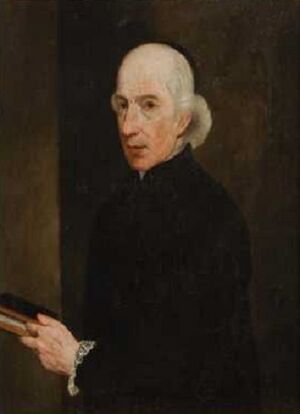Saverio Bettinelli facts for kids
Quick facts for kids
Saverio Bettinelli
|
|
|---|---|

Portrait of Saverio Bettinelli by Domenico Conti Bazzani, 1800
|
|
| Born | July 18, 1718 Mantua, Duchy of Mantua
|
| Died | 13 September 1808 (aged 90) Mantua, Kingdom of Italy
|
| Nationality | Italian |
| Other names | M. Versajo Melasio Diodoro Delfico |
| Occupation |
|
| Parent(s) | Girolamo Bettinelli and Paola Bettinelli (née Frugoni) |
| Academic background | |
| Influences | |
| Academic work | |
| Era |
|
| Discipline | Literary criticism, italian studies, Medieval studies |
| Institutions | University of Modena |
| Influenced |
|
Saverio Bettinelli (18 July 1718 – 13 September 1808) was an Italian Jesuit writer. He became known as a polymath, dramatist, polemicist, poet, and literary critic. He was a friend of some of the leading authors of his times: Voltaire, Francesco Algarotti, Vincenzo Monti and Ippolito Pindemonte. Théodore Tronchin, Guillaume du Tillot, Melchiorre Cesarotti, Giacomo Filippo Durazzo, Pietro Verri, Giammaria Mazzucchelli and Francesco Maria Zanotti were among his correspondents.
Life
He was born at Mantua; there and later in Bologna, he studied under the Jesuits, till entering in novitiate in 1736, then formally consecrated as a priest in 1738.
He first taught literature from 1739 to 1744 at Brescia, where Cardinal Quirini, Count Federico Mazzuchelli, Count Duranti and other scholars, formed an illustrious academy. He next went to Bologna, to study divinity. There he was in contact with the circle including the poet Marini, Algarotti, and Zanotti. At the age of thirty he went to Venice, where he became professor of rhetoric. There he wrote the satirical poem Le raccolte (1751), in which he called for a reform of the Italian poetic tradition, aimed at both the literary elite and the public. The superintendence of the college of nobles at Parma was entrusted to him in 1751; and he had principal charge of the studies of poetry and history, and the entertainments of the theatre. He remained there eight years, visiting, at intervals, other cities of Italy, often on the affairs of his order.
In 1755-1758 he undertook a series of journeys. First travelling to Germany in 1755, proceeded as far as Strasbourg and Nancy. He returned to Italy as a tutor to the sons of the Prince of Hohenlohe. The year following, he journeyed again to France, along with the eldest of his pupils; and during this excursion he wrote his famous Lettere dieci di Virgilio agli Arcadi, which were published at Venice. Bettinelli was also a poet of arcadic verse, collected in his Versi sciolti of 1758 and inspired by Frugoni and Algarotti, and of some tragedies including Gionata (1774), Demetrio Poliorcete (1758), Serse (1764) that were put on for the jesuit theater. In 1758 he went to Lorraine, to the court of King Stanislaus, who sent him on a matter of business to visit Voltaire. He would also meet in France with Rousseau and Helvétius.
From Geneva he returned to Parma, where he arrived in 1759. He afterwards lived for some years at Verona and Modena, and he had just been appointed professor of rhetoric there, when, in 1773, the suppression of the Jesuit Order occurred in Italy, he had to abandon his teaching post at Modena, Bettinelli returned home, and resumed his literary labours with new ardor. The siege of Mantua by the French compelled him to leave the city, and he retired to Verona, where he formed an intimate friendship with the chevalier Ippolito Pindemonte.
His major works are the literary criticisms and observations of culture. In 1757, he penned a series of letters addressed to Virgil in which he criticized the Divine Comedy by Dante Alighieri, and affirmed that Among the erudite books, only certain parts from the Divine Comedy should be included, and these would form no more than five cantos Voltaire was to praise his idiosyncratic opinions.
In 1766 he wrote Lettere inglesi where he proposes good taste in modern literature. In Dell'entusiasmo delle belle arti (On Enthusiasm in the Fine Arts, 1769), he exalts enthusiasm as a source of inspiration for fantasy in art according to a tendency that was pre-romantic. Among his main works is an influential sketch of the progress of literature, science, fine arts, industry, and customs in Italy, originally titled Risorgimento negli studi, nelle, Arti e ne' Costumi dopo di Mille (The Revival of Italy in Scholarship, Arts and Customs After 1000, 1773).
In 1797 Bettinelli returned to Mantua. Though nearly eighty years old, he resumed his labors and his customary manner of life. He undertook in 1799 a complete edition of his works, which was published at Venice in 24 vols. At this death at the age of 90 years, he still retained his gaiety and vivacity of mind.
Works
- Opere edite ed inedite in prosa ed in versi. Seconda edizione riveduta, ampliata, e corretta dall'Autore, 24 vols., revised and enlarged edition, Venice: Cesare, 1799-1801.


